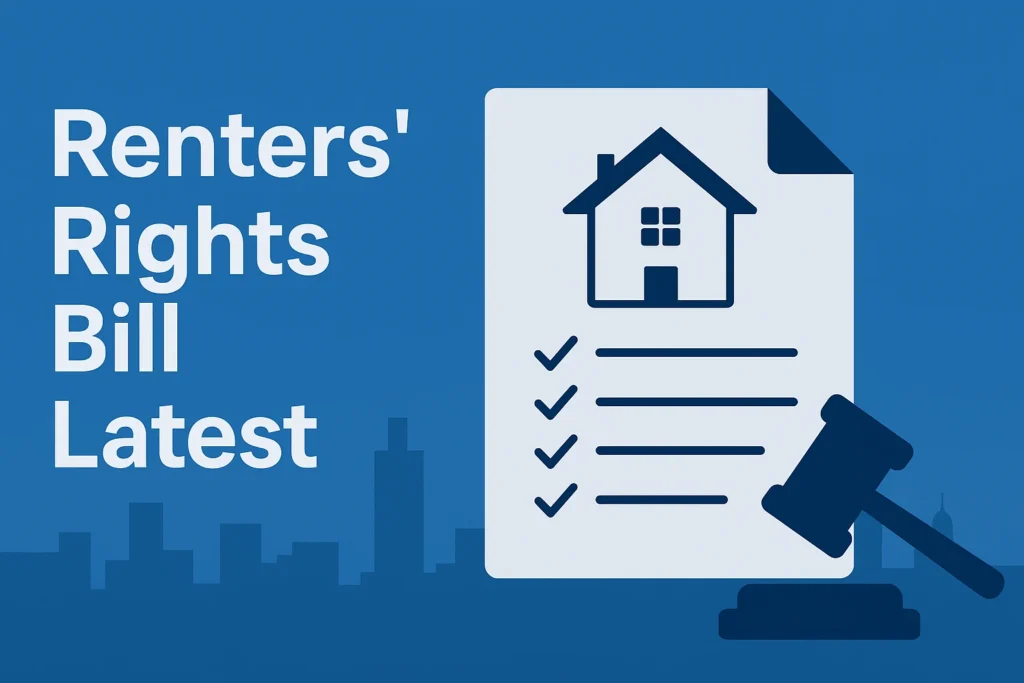Renters’ Rights Bill Update: Landmark Legislation Set to Become Law
After years of anticipation, the Renters’ Rights Bill has finally cleared its final House of Commons debate and is expected to receive royal assent in the coming weeks — officially becoming law. This marks one of the most significant overhauls to the private rental sector in decades.
For a detailed look at the original proposals and background to this legislation, see our earlier article: Upcoming Renters’ Reform Bill Changes. That post explains the key measures first outlined by the government and how they aimed to rebalance rights between tenants and landlords.
In this latest renters’ rights bill update, we look at how the bill has evolved since its early stages, what this means for landlords and tenants, and when the new rules are likely to take effect.
The Renters’ Rights Bill Nears Royal Assent
After years of political discussion, the Renters’ Rights Bill has now completed its final House of Commons debate and is set to become law once it receives royal assent — expected in the coming weeks.
This marks a historic moment for landlords and tenants across England. Originally proposed back in April 2019 by former Prime Minister Theresa May, the pledge to end no-fault evictions (Section 21) has taken more than six years to reach this point.
In Wednesday’s (22 October) debate, Housing Minister Matthew Pennycook described the legislation as a “transformational piece of legislation” — one that aims to provide greater security for renters while ensuring fair treatment for responsible landlords.
What Does the Renters’ Rights Bill Mean for Landlords?
The bill introduces several fundamental changes to the private rental sector. While its intent is to protect tenants, landlords will also see significant shifts in how they manage properties.
Key proposed changes include:
Abolition of Section 21 ‘no-fault’ evictions – landlords will need to use Section 8 grounds for possession.
More predictable tenancies – most tenancies will become open-ended, removing the typical fixed-term AST model.
Tougher property standards – landlords must maintain higher levels of property safety and habitability.
More transparent rental increases – stricter rules on rent review frequency and tenant challenges.
Although this introduces new responsibilities, professional landlords who already manage properties compliantly will likely adapt easily.
Why It’s Taken So Long to Get Here
The journey from policy promise to legislation has been unusually drawn-out. Since Theresa May’s original announcement in April 2019, successive governments have revisited and reworked the proposal amid political changes, the pandemic, and concerns about balancing landlord and tenant interests.
Now, over six years later, the Renters’ Rights Bill is finally approaching the statute books. It reflects growing public pressure to make renting fairer, safer, and more stable — particularly in cities like Manchester, where demand for rental properties remains high.
How Novellus Property Management Can Help Landlords Adapt
As the private rental sector faces new compliance demands, professional property management becomes more valuable than ever.
At Novellus Property Management, we help landlords across Manchester stay compliant, profitable, and stress-free. From tenant screening and rent collection to maintenance management and legal compliance, our experienced team ensures you meet every new regulation with confidence.
If you want to safeguard your investment and prepare for the impact of the Renters’ Rights Bill, explore our:
Fully Managed Service – ideal for hands-off landlords.
Let Only Service – perfect if you prefer to manage the tenancy yourself after setup.
We’ll be on hand to give guidance to our landlords regarding the Renters’ Rights Bill, no matter which service you go for.
What Happens Next?
Once the bill receives royal assent, the government will begin a phased rollout of its provisions — likely over several months. Landlords should use this time to review their tenancy agreements, eviction procedures, and compliance processes to ensure alignment with the new law.
Some industry experts expect key changes such as the abolishment of Section 21 notices and move to Periodic Tenancies to come in immediately when the Act becomes law, with other changes expected to follow over the following months.
The Renters’ Rights Bill represents the biggest shake-up of the private rental market in a generation. While it will bring tighter rules, it also offers a clearer framework for landlords who operate responsibly.
📞 Contact Novellus Property Management today to discuss how these upcoming changes could affect your portfolio and how we can help you stay ahead of new legislation.



